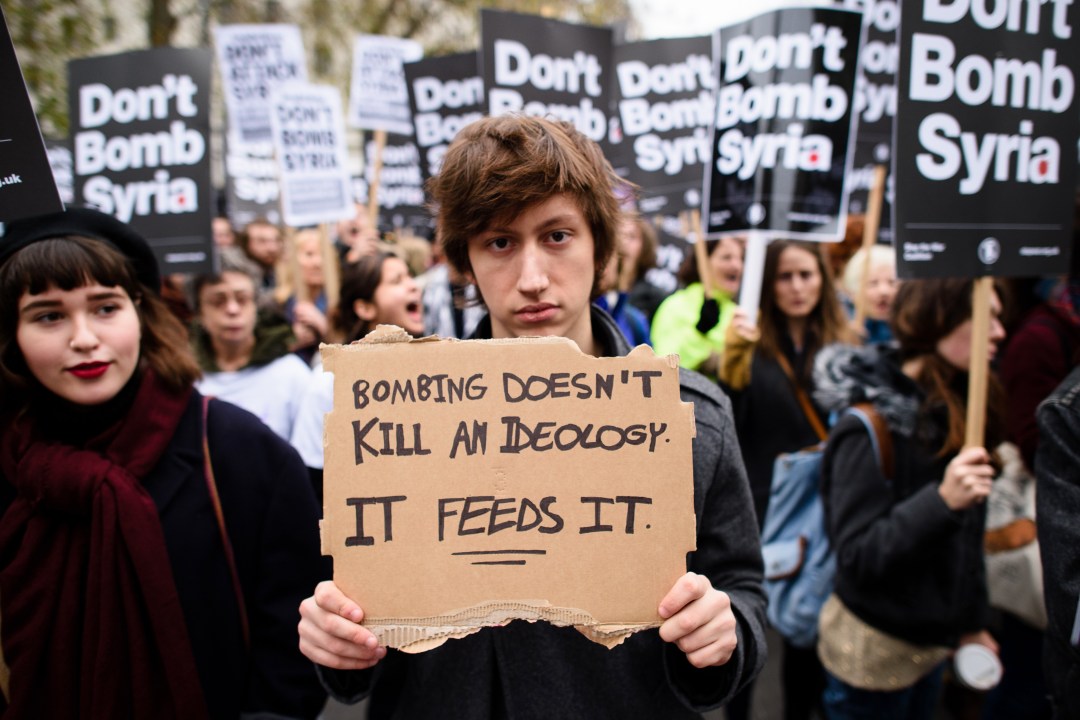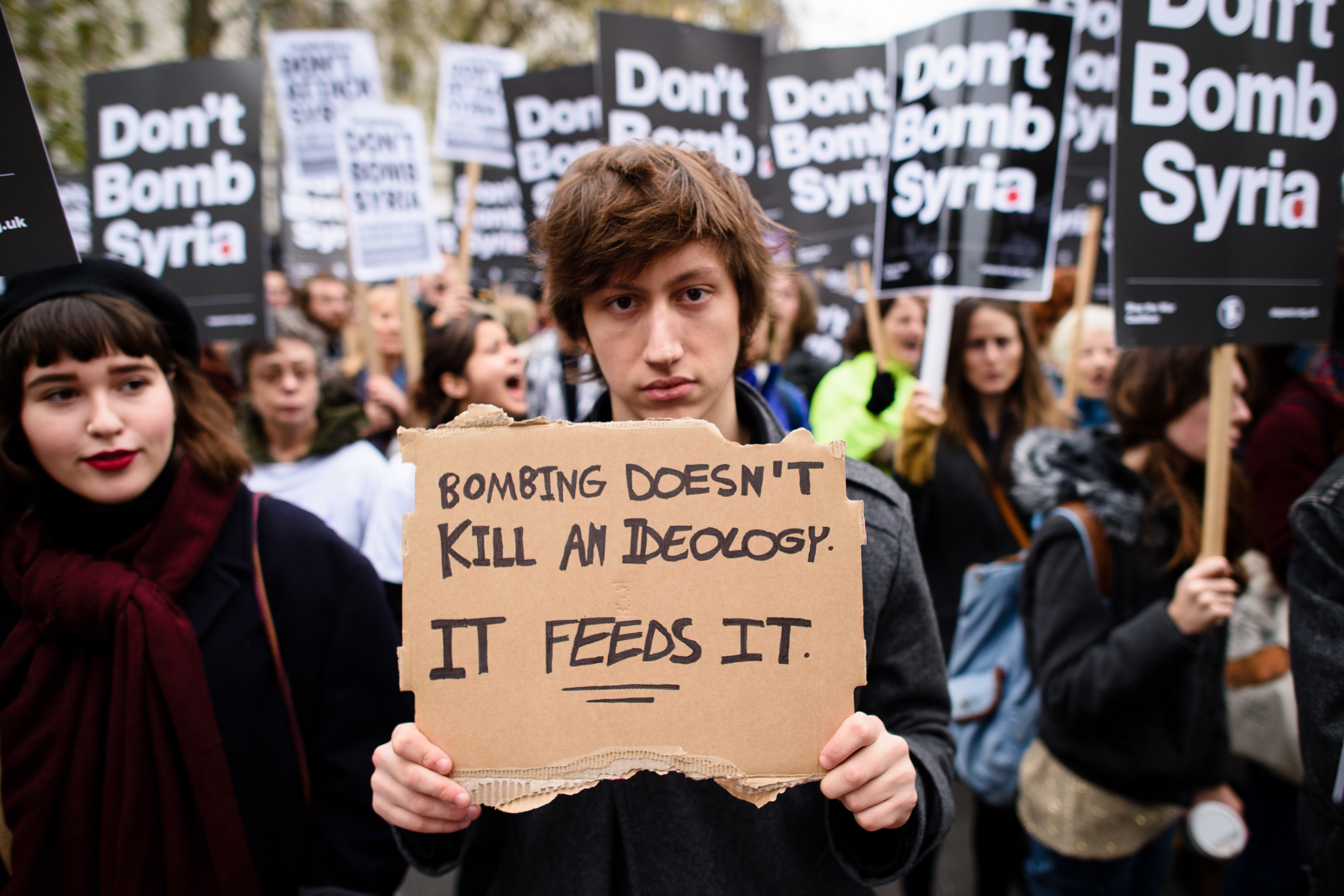Well, this is another fine mess, isn’t it? Jeremy Corbyn opposes (surprise!) extending the UK’s anti-ISIS mission from Iraq to Syria and this, we are told, is the Labour party’s official position. Nevertheless, Labour MPs will not be whipped whenever the matter is eventually put to a vote in the House of Commons. They will be free to vote as their conscience, and their calculation of the national interest, demands. By virtue of discovering that all his other options were unsustainable, Corbyn has blundered into the only choice that was feasible all along. Truly, another memorable profile in leadership.
Now you may object that the whole rigmarole is unnecessary in the first place since it is only a recent, tricked-up, pseudo-convention that demands this kind of parliamentary authorisation and you would have a point. Nevertheless, again, we are where we are.
And given the shambles currently masquerading as the Labour party you can also see why MPs from other parties are smugly congratulating themselves on not being part of the Labour party.
It will surprise no-one that SNP MPs are the smuggest of all. Last night the nationalists were busy tweeting that, in stark contrast to the chaos within the Labour party, the SNP were organised, united, and resolute. And indeed they are. It is also the case that this is, ordinarily, a good or at least useful thing.
Not all moments are ordinary moments, however. With Labour conceding a free vote and the Conservatives effectively doing the same, the SNP position begins to look a little suspicious. Is it really possible, does it pass any elementary test of credibility, to think that all 54 (for the time being) SNP MPs hold exactly the same opinion on a matter that has, everywhere else, divided the country? And not just the 54 nationalists MPs at Westminster either. None of the SNP’s MSPs have wandered off the policy reservation either. If it weren’t so suspicious this unanimity might be impressive.
Because most people, or at least those prepared to argue in good faith, can acknowledge that each side in this argument has a point. Critics of extending the RAF’s mission from northern Iraq into Syria are right to ask if doing so can make a material difference to the struggle against ISIS. They are also right to worry about an endgame. And even their concerns about ‘blowback’ are not entirely pusillanimous. There is much to be wary of and obvious answers or even semi-plausible solutions are notable for their absence.
Which helps explain why, contrary to the fevered imaginings of the left, there is no rush to war. Almost no-one proposes expanding Britain’s role in this conflict without at least some degree of trepidation. Those who favour doing more to increase the price of joining and fighting for ISIS do so knowing that not everything can be known. War is not a knitting pattern to be followed to its predictable conclusion. Demanding that every question and every hypothetical scenario be answered is, in the end, a polite way of signalling your thorough objection to the whole enterprise. Not every question can be answered.
Nor can every active policy decision – as contrasted with the passive approach favoured by some – be pursued with any great confidence of success. The struggle against ISIS demands improvisation. Circumstances change, often rapidly, and policy must change with them. Which is also why what people said and thought about Syria in 2013 doesn’t matter so very much in 2015. It is a different situation now. Paris changed the calculation.
It’s also why it might (your mileage may vary) still be right to extend the mission into Syria even if this really did – and could be proven to do so – increase the short-term risk to the United Kingdom. There are a number of reasons for thinking so but among the more persuasive, I suggest, is the fact that the UK is already at risk and, viewed in the long-term, that risk seems depressingly unlikely to disappear. Not for as long as Islamic State’s worldview remains intact and the organisation continues to attract the support of a troubling number of British citizens.
That demands, of course, a domestic strategy as well as an overseas one. But it is a nonsense to suppose that would-be jihadis are only motivated or radicalised by their opposition to the wars in Afghanistan and Iraq. Few people doubt, I think, that this has played a role but the truth is we would still be subjected to this kind of threat even if British troops had never been deployed to Helmand or Basra.
After all, Mohammed Siddique Khan, the lynchpin of the 7/7 bombings, attended a terrorist training camp in Kashmir in the summer of 2001. Before 9/11 that is. Before Afghanistan. Before Iraq. Before it became fashionable to make excuses for terrorists. Bad things happen and not all of those things can be blamed on Tony Blair.
Logically, of course, those who oppose targeting ISIS in Syria should also oppose targeting ISIS in Iraq. Yet, in general, many of the people opposing attacking ISIS in Syria do not call, at least not loudly, for the British mission in Iraq to be abandoned. But, rationally, they should. Because if bombing ISIS in Syria makes Britain a ‘target’ then doesn’t bombing ISIS in Iraq do so too? In other words, we are already in this fight even if we have drawn wholly artificial and illogical dividing lines defining the limits of our engagement.
Then again, if the UK were to play no part in any aspect of this conflict, if it were to bring every soldier, sailor and airman home, if it were to actually accede to many of the demands asked of it by ISIS and its fellow-travellers, does anyone think that would be the end of the matter? Does anyone think the opposition, the enemy – for such they are – would say ‘Fair enough. No worries. No need to bother you now. Sorry for any trouble we caused.’? Really? Come on. Their demands aren’t meant to be met either. They’re supposed, instead, to offer a fig-leaf of justification for their actions. And you can always find a fig-leaf.
Are airstrikes enough? Possibly not. Not if we think in terms of victory. But that’s not really the objective. That’s much more limited: containing and then squeezing ISIS. It may not be enough; it is hard to see how it can be less effective than not containing and squeezing ISIS.
Still, as I say, I can understand why people would view the situation and come to different conclusions. It’s for that reason that, actually, a free vote on military action is far from deplorable; it might even be the most responsible way forward.
That doesn’t mean MPs are duty bound to listen to their constituents, far less have their vote decided by the weight of their postbag. That opinion polls show the public supporting airstrikes does not mean the public are right. But it does make me extremely suspicious of any party that claims to be united on this matter, far less united without even the merest whisper of a contrary view being heard.








Comments